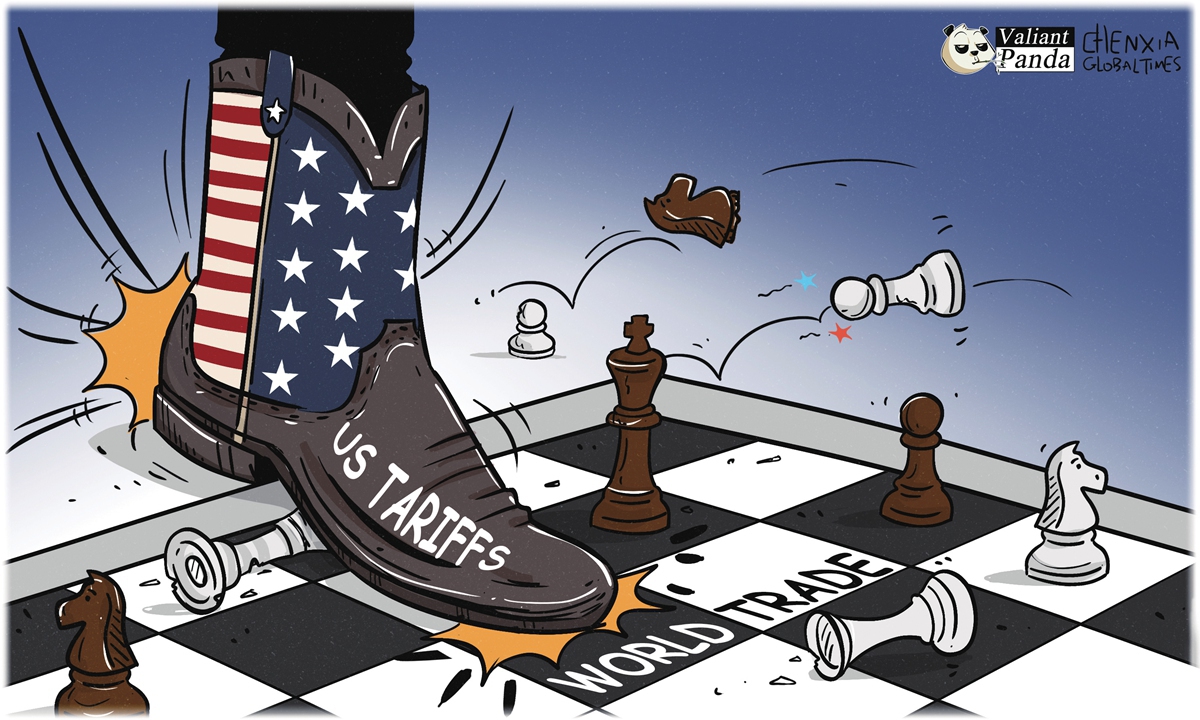
Illustration: Chen Xia/GT
Recently, multiple media outlets have reported that the US government plans to use ongoing tariff negotiations to pressure its trade partners, demanding that they limit trade with China in exchange for tariff exemptions. On Monday, in response to a reporter’s question, a spokesperson for China’s Ministry of Commerce stated that the US’ actions are to use the banner of “reciprocity” as a pretext to pursue hegemonic politics and unilateral bullying in the field of international economics and trade. The spokesperson also emphasized that “appeasement does not bring peace, compromise does not lead to respect,” adding that “attempts to trade the interests of others for tariff exemptions are doomed to fail and will ultimately harm all parties involved.” This statement has garnered widespread attention globally.
China’s response is easily understandable. Washington’s blatant coercion of negotiating parties to “pick sides” and its open attempt to contain and isolate China lay bare its arrogant and hegemonic intentions, representing a blatant defiance and disruption of the global economic and trade order. China’s response is not only to safeguard its national interests and dignity but also to stand up in defense of the international economic and trade order as well as international fairness and justice. At the same time, China’s stance is clear: international trade must never revert to the “law of the jungle,” where the strong prey on the weak. All parties must contribute to preserving this vital international trade order.
Despite leveraging its advantage as the largest consumer market, the US intends to coerce and manipulate dozens of negotiating parities with both threats and inducements, these parities clearly see how the US has repeatedly broken its promises and gone back on its word; they also clearly see how China has firmly opposed hegemony and defended fairness. This time, the US has dangled the bait of “tariff exemptions,” demanding that its trade partners limit trade with China. In doing so, it has overestimated its own power, underestimated China, and misjudged the situation.
As we all know, China is the major trading partners for more than 150 countries and regions, with its total goods trade ranking first in the world for eight consecutive years. These economic and trade relations, through global supply chains, have benefited countless businesses and consumers worldwide. Meanwhile, China is the “stabilizing anchor” of the world economy and global production and supply chains, and decoupling from China is tantamount to voluntarily abandoning this open and opportunity-filled market, which will only lead to gradual marginalization of themselves in the wave of global economic development. Therefore, the US’ attempt to “cut off” China’s economic and trade ties with the world is like “eating soup with a fork” and will inevitably end in failure.
UK Chancellor of the Exchequer Rachel Reeves stated before heading to the US for trade deal talks that it would be “very foolish” to cut business ties with the Chinese market, supporting instead for strengthening ties with China. This pragmatic stance echoes the sentiments of the international community. Additionally, politicians, economists, and business executives from ASEAN, the EU, Japan, and South Korea have voiced their unwillingness to choose between the US and China.
A more vivid example is unfolding in Guangdong, China, where the 137th Canton Fair has attracted nearly 150,000 overseas buyers from 216 countries and regions, a 20.2 percent increase from the same period last year. This clearly demonstrates that political coercion cannot suppress the inherent momentum of economic globalization and multilateralism.
The World Trade Organization (WTO) explicitly requires members to adhere to the principle of non-discrimination. This is both built on the practice of the international community over the past decades and represents the greatest common denominator for maximizing the shared interests of all economies. In the face of unilateralism and protectionism, China’s position remains firm: to defend international economic and trade rules and the multilateral trading system, as dictated by both logic and global trends.
For every economy embedded in today’s highly interconnected production and supply chains, fair and reasonable rules are essential. This concerns whether international trade can continue to be protected by a legal framework. Imagine if global trade were to regress to a time when “whoever has the loudest voice has the final say,” the result would be chaos and disorder. More importantly, without the constraints of rules, hegemonic powers would grow increasingly aggressive, causing lasting damage to global development.
A study by Oxford Economics modeled a “fractured world” scenario modelling increasingly protectionism, globalization unwinds as governments champion economic nationalism and promote self-reliance through increased trade restrictions. It found that emerging markets are the hardest hit.
As stated in the recently signed “anti-tariff declaration” by renowned economist N. Gregory Mankiw and over a thousand people: “Sound economic principles, empirical evidence, and the warnings of history will prevail over the protectionist mythologies of the moment.” As for the type of agreement that the negotiating parties and Washington will reach, and what kind of inconsistent and untrustworthy versions may emerge, it is believed that each party will have its own considerations and judgment. But if anyone makes a submission to the US at the expense of China, China will not accept it.
China welcomes all parties to continue riding the express train of development, but this does not mean it will compromise on its core interests. Surrendering to unilateralism and protectionism not only undermines the multilateral trading system but also threatens the very foundation of the global economic order. We hope all parties take the long view and make the right decision.





